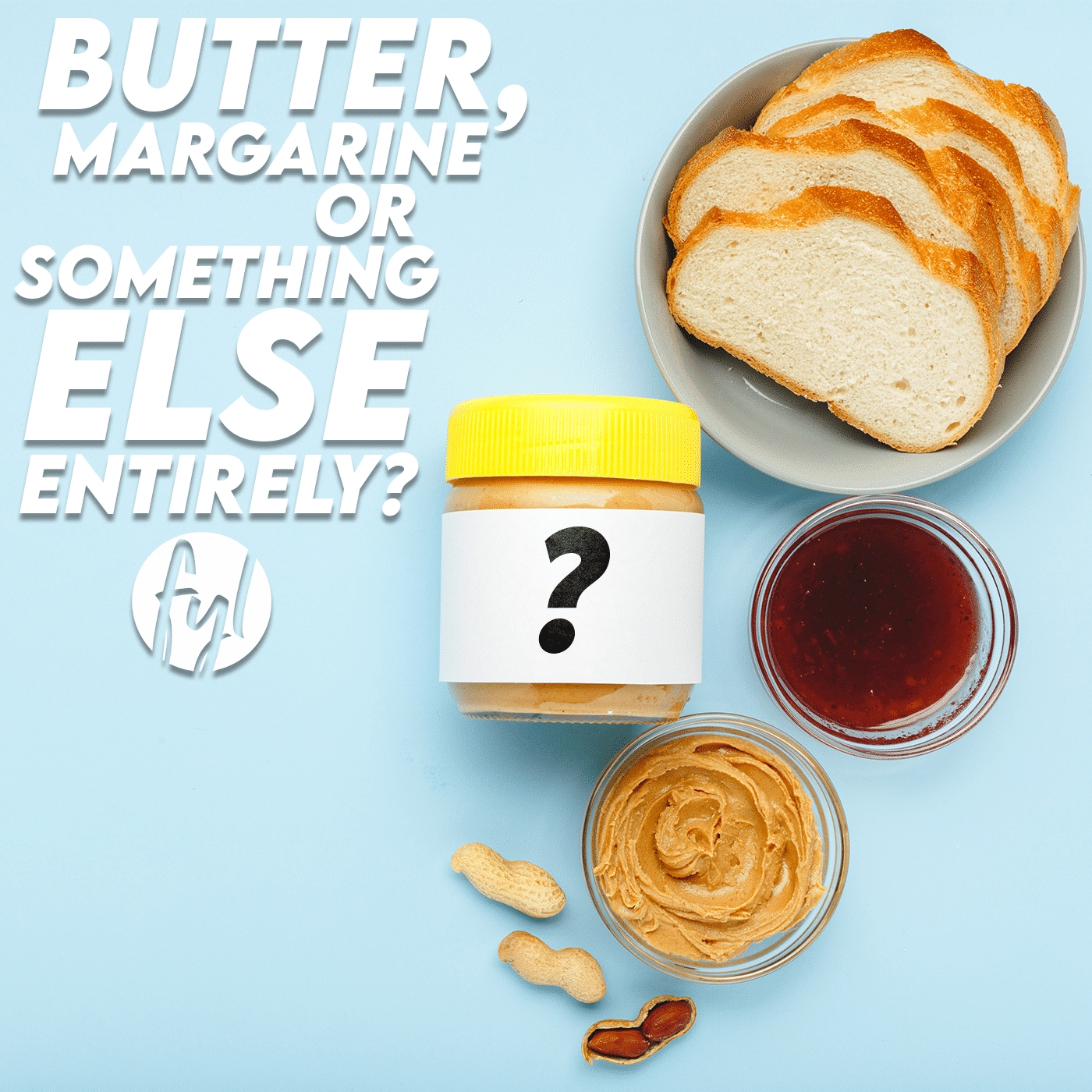Butter or margarine? Has become a hotly contested topic with strong arguments on both sides. Should you be spreading margarine or butter on your toast? Not to throw the ball completely left of field, but the short answer is that there are better options out there.
Good quality margarine is still the best choice in terms of cardiovascular health as it has a lower saturated fat content and more beneficial monounsaturated and polyunsaturated fats compared with butter.
However, both butter and margarine are relatively nutrient-poor and pretty high in energy gram for gram. Let’s do a bit of a comparison:
The Stats
| Western Star Spreadable Original Soft | Flora Margarine Spread Original | |
| Per 100g | Per 100g | |
| Energy | 2570 kJ | 2340kJ |
| Protein | < 1 g | < 1 g |
| Total Fat | 68.4 g | 63.1 g |
| Saturated Fat | 28 g | 16.5 g |
| Carbohydrate | <1 g | <1 g |
| Sugars | <1 g | < 1 g |
| Fibre | < 1 g | < 1 g |
| Sodium | 487 mg | 450 mg |
We have compared them per 100g for simplicity sake as both products have different serving suggestions. As you can see both have fairly comparable fat and energy content, however, the margarine wins this round as the saturated fat content is about 40% lower.
Outside of that, both butter and margarine offer very little in terms of nutrients. Butter is a source of vitamins A, D, E, B12 and vitamin K2, but there are better lower energy more nutritious ways to get these vitamins. Margarine is typically fortified with vitamin A and D – again there are better ways to get these nutrients.
So, let think outside the box. What else could you be spreading on your toast? What are these more nutritious options?
Nutritious Alternatives to Butter & Margarine
Avocado
This isn’t new news. There are jokes about millennials and their “avocado toast” addiction and the reality is, they are onto something. Avocado per 100g has around 70% fewer kilojoules than margarine. That’s right you read right!
This is owed to the fact that avocado is much lower in fat than margarine with only 15g per 100g, with only 2.1g of that coming from saturated fat. Avocado is loaded with heart-healthy monounsaturated fats, fibre, folate, B vitamins, vitamin K, vitamin E, magnesium and copper.
A tablespoon of avocado spread onto your toast is going to offer more vitamins and minerals and be much better for weight management.
Hummus
The Mediterranean dip made from chickpeas has become heavily popularised in more recent years and for good reason. The addiction is real for many with supermarkets often selling bucket size tubs of the stuff. Once again, hummus is waist-line friendly having around 70% fewer kilojoules than margarine.
Hummus contains virtually no saturated fat with only 1.4g per 100g. In addition, it is also an excellent source of dietary fibre, protein, manganese, phosphorus, iron, zinc and potassium. Versatile and easy to use it can be spread on toast, on a salad wrap or used as a dip.
Peanut Butter
This humble pantry staple is anything but basic. Although peanut butter has a comparable amount of kilojoules to butter and margarine (2499kJ per 100g), it has a lot to offer. Peanut butter has 40% less saturated fat than margarine and 75% less saturated fat than butter, with most of its fat content coming from heart-healthy monounsaturated fats.
It’s also a good source of protein, fibre, vitamin E, B vitamins, iron, magnesium, potassium, phosphorus, zinc, copper, manganese and selenium.
With its long shelf life and lack of need for refrigeration, it is a convenient option. Keep a jar in the pantry or your desk drawer. Use it on toast, sandwiches, crackers, celery sticks, cut up apple slices or on its own. Just be wary of portion sizes as one tablespoon is a serve!
Tahini
Tahini is a paste made from ground up sesame seeds, heavily used in Mediterranean cuisine (it’s an ingredient in hummus). Its popularity has been gradually growing here in the west, but it is far from a household staple as yet. Tahini much like peanut butter has a comparable energy content to margarine and butter with 2499 kJ per 100g. However, it boasts a saturated fat content of only 8g per 100g. It is high in heart-healthy monounsaturated and polyunsaturated fats and is abundant in micronutrients.
Tahini is a source of dietary fibre, folate, B vitamins, calcium, iron, magnesium, phosphorus, zinc, copper, manganese and selenium.
It works well as a spread on salad wraps, crackers, or mixed with some lemon juice salt and pepper as a salad dressing.
So, What Now?
There are many more options out there other than butter or margarine to top your bread. This article is not exhaustive of all the options out there. Margarine (a good quality one) is still better for heart health than butter, but it is time to change the way we think. There are much better options that offer more nutrients, it’s time to get across those. If you would like more ideas on clever swaps or ways to pack more nutrition into your diet, talk to one of our dietitians now!







